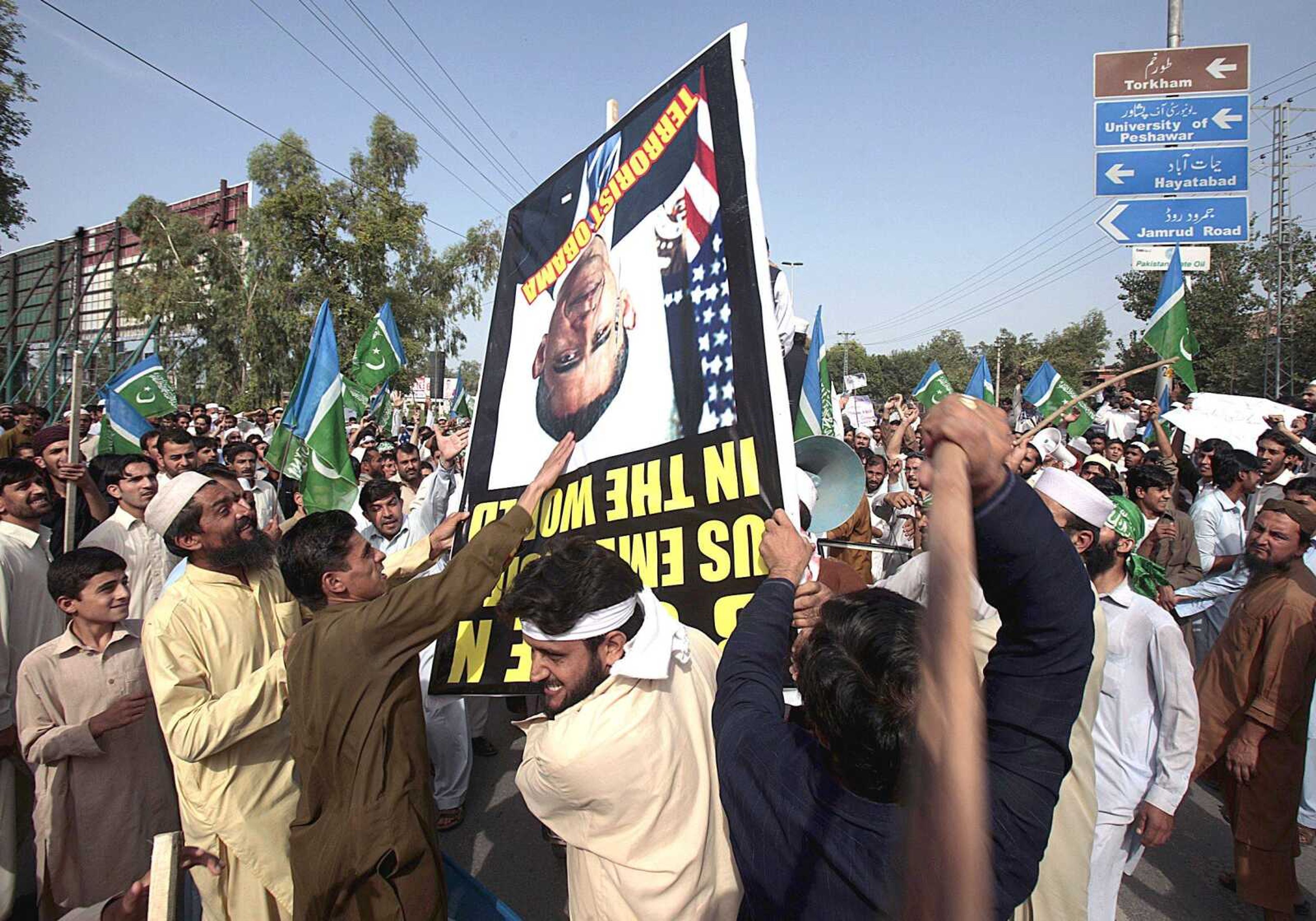Al-Qaida threatens attacks on U.S. diplomats over film
CAIRO -- Al-Qaida's branch in North Africa on Tuesday called for attacks on U.S. diplomats and an escalation of protests against an anti-Islam video that was produced in the United States and triggered a wave of demonstrations and riots in the Middle East and beyond...
CAIRO -- Al-Qaida's branch in North Africa on Tuesday called for attacks on U.S. diplomats and an escalation of protests against an anti-Islam video that was produced in the United States and triggered a wave of demonstrations and riots in the Middle East and beyond.
While demonstrations have tapered off in nations including Egypt and Tunisia, protests against the film turned violent in Pakistan and Indian-controlled Kashmir, and hundreds of people rallied in Indonesia and Thailand.
In Kabul, the Afghan capital, a suicide bomber rammed a car packed with explosives into a minibus carrying South African aviation workers to the airport, killing at least 12 people in an attack that a militant group said was revenge for the film "Innocence of Muslims," which was made by an Egyptian-born American citizen.
Afghan President Hamid Karzai said the attack killed eight South Africans, three Afghans and a Kyrgyzstani.
Twelve protesters have died in riots in several countries, bringing the total number of deaths linked to unrest over the film to at least 28. That figure includes Christopher Stevens, the U.S. ambassador to Libya, and three other Americans killed in an attack there.
The White House said the violent protest in Libya appeared to have been sparked by the film, but that the matter was still under investigation and the assessment could change.
U.S. officials describe the video as offensive, but the American government's protection of free speech rights has clashed with the anger of Muslims abroad who are furious over the depiction of the Prophet Muhammad as a fraud, womanizer and pedophile.
In a statement, Al-Qaida in the Islamic Maghreb praised the killing of Stevens in the attack on the U.S. Consulate in Benghazi on Sept. 11. The group threatened attacks in Algeria, Tunisia, Morocco and Mauritania, and condemned the United States for "lying to Muslims for more than 10 years, saying its war was against terrorism and not Islam."
The group urged Muslims to pull down and burn American flags at embassies, and kill or expel American diplomats to "purge our land of their filth in revenge for the honor of the Prophet."
Yemen-based al-Qaida in the Arabian Peninsula recently issued a similar call for attacks on U.S. diplomatic facilities. It is al-Qaida's most active branch in the Middle East.
An Islamist militant group, Hizb-i-Islami, claimed responsibility for the attack in Kabul. The group is headed by 65-year-old former warlord Gubuddin Hekmatyar, a former Afghan prime minister and one-time U.S. ally who is now listed as a terrorist by Washington. The militia has thousands of fighters and followers across the country's north and east.
In Pakistan, hundreds of angry protesters broke through a barricade outside the U.S. Consulate in the northwest city of Peshawar, sparking clashes with police that left several wounded on both sides, said police officer Arif Khan. The demonstrators threw bricks and flaming wads of cloth at the police, who pushed them back by firing tear gas and rubber bullets and charging with batons. The protest was organized by the youth wing of the hardline Jamaat-e-Islami party.
In Kashmir's main city of Srinagar, a strike shut down businesses and public transportation as marchers burned U.S. flags and an effigy of President Barack Obama. When the protesters tried to march into the main business district, police fired tear gas and used batons to disperse them, a police officer said on condition of anonymity because he was not authorized to speak to reporters. Protesters hurled rocks at the troops, he said. There were no immediate reports of injuries.
An alliance of Kashmiri religious groups called the strike in response to the anti-Islam film. The shutdown was supported by the bar association, trade unions and separatist groups in the volatile region, where strikes are a common tactic to protest against Indian rule.
In Indonesia, about 200 people from various Islamic groups torched an American flag and tires outside the U.S. Consulate in the third largest city of Medan. Some unfurled banners saying, "Go to hell America," while others trampled on dozens of paper flags. Also Tuesday, about 100 Muslim students in Makassar, a city in central Indonesia, called for the death penalty against the filmmaker, Nakoula Basseley Nakoula.
Some 400 people protested peacefully outside the U.S. Embassy in Bangkok, Thailand's capital. Protesters carried signs and banners saying, "We love Prophet Muhammad" and "Stop insulting our religion," and chanted, "Down with America" and "Down with Israel."
The government in Bangladesh blocked YouTube on Monday to prevent people from seeing the video. Mir Mohammaed Morshed, a spokesman for the state-run Bangladesh Telecommunications Company Ltd., said the decision will remain effective until further notice.
Google has blocked access to the video in Libya and Egypt following violence there, and in Indonesia and India because it says the video broke laws in those countries.
---
Associated Press writers Riaz Khan in Peshawar, Pakistan and Aijaz Hussain in Srinagar, India contributed to this report.
Connect with the Southeast Missourian Newsroom:
For corrections to this story or other insights for the editor, click here. To submit a letter to the editor, click here. To learn about the Southeast Missourian’s AI Policy, click here.









